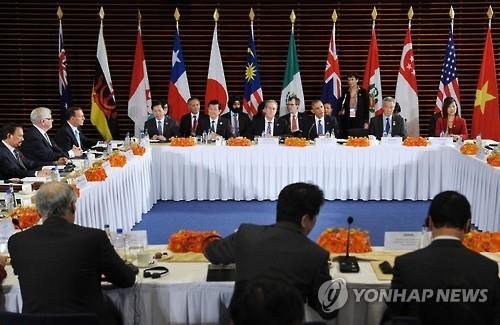TPP withdrawal could weaken US status in Asia-Pacific: think tank
By KH디지털2Published : Feb. 13, 2017 - 17:49
The United States' recent withdrawal from the Trans-Pacific Partnership free trade agreement is expected to weaken its economic and strategic status in the Asia-Pacific region, a state-run think tank in Seoul said Monday.
Last month, US President Donald Trump issued an executive order to pull out from the TPP, which was signed by his predecessor Barack Obama after seven years of negotiations with 11 countries.
It has yet to be ratified due to US withdrawal.

"President Trump's decision to withdraw from the TPP can pave the way for China to expand its influence in the Asia-Pacific region through its Regional Comprehensive Economic Partnership," Kang Seon-jou, an associate professor of the Institute of Foreign Affairs and National Security, said in a report.
The US motive for its initial participation in the TPP was "to restore its influence in the Asia-Pacific region and secure a leadership role in regional integration efforts" after the country was relatively estranged from Asia because of its wars in Afghanistan and Iraq as well as the 1997 Asian financial crisis, he noted.
To counter the U.S. "rebalancing" efforts, China launched its own regional free trade scheme RCEP, which promises "the world's largest trading bloc."
"The U.S. withdrawal from the TPP would (also) put China at a strategic advantage in the Asia region ... and could send a signal to the Asia-Pacific countries that the U.S. is retreating from the region at a critical juncture, which in turn could weaken the US economic and strategic status," said the professor of IFANS, the research arm of the state-run Korea National Diplomatic Academy.
Globally, the pullout is expected to trigger trade protectionism, prolong sluggish growth and impair US leadership, the researcher said.
"More fundamentally, President Trump's decision to withdraw from the TPP under the idea of 'America First' can be tantamount to denying the liberal international order that the US established after World War II, and thus could accelerate its erosion."
Despite the US withdrawal, however, the remaining TPP members have not followed suit yet, which the professor said suggests a possibility that the Trump administration could reverse course to try to modify the TPP or launch a new type of FTA for the region.
"President Trump might initiate a new FTA for the Asia-Pacific region by modifying the TPP into a minilateral form or revising the content and name of the TPP while maintaining the current members," the report said, citing the FTA's economic and geopolitical benefits as incentives for the US. (Yonhap)








![[KH Explains] How should Korea adjust its trade defenses against Chinese EVs?](http://res.heraldm.com/phpwas/restmb_idxmake.php?idx=644&simg=/content/image/2024/04/15/20240415050562_0.jpg&u=20240415144419)










![[Today’s K-pop] Stray Kids to return soon: report](http://res.heraldm.com/phpwas/restmb_idxmake.php?idx=642&simg=/content/image/2024/04/16/20240416050713_0.jpg&u=)